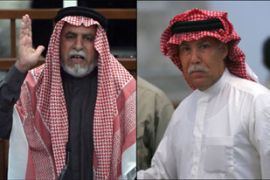Saddam aides buried in Awja
Iraqi government shows official video of the hanging of Saddam aides to journalists.
The Iraqi authorities say the video will not be released to the public.
Later on Monday, family members and supporters gathered in Awja to bury al-Tikriti and al-Bander. Their bodies were draped in the Iraqi flag.
Earlier in the day, police said that two graves had been opened close to where Saddam, the former Iraqi president who was also executed, is buried. Saddam was born in Awja, a small town near Tikrit.
Al-Tikriti and al-Bandar, the former head of Iraq’s Revolutionary Court, were hanged after being found guilty in an Iraqi court in connection with the killing of 148 Shia Iraqis in Dujail in 1982.
The police said the bodies had been transported from Baghdad to the US military base in Tikrit prior to burial at Awja. Tikrit is 130km north of Baghdad.
Interviewed by Al Jazeera’s Stephen Cole, Tariq al-Hashemi, vice-president of Iraq and a leader of the Iraqi Islamic Party, said: I made known my reservations about the executions because the presidential council should be in charge of these things.
“The constitution states that all execution orders should be passed through the presidential office for signing. In addition, President [Jalal] Talabani asked the prime minister [Nuri al-Maliki] to postpone and to revise these verdicts.
“But the government has not been heeding these appeals.”
Questions
Earlier, speaking to Al Jazeera’s Arabic channel, Khalaf al-Olayan, a leader of the main Sunni bloc in parliament, demanded to see the video taken during the execution: “It is impossible for a person to be decapitated during a hanging,” he said. “This shows that they [the government] have mutilated the body and this is a violation of the law.
“We want to see the video that was taken during the execution of the two men in order for them [government] to prove what they are saying.”
EU chief speaks out
Jose Manuel Barroso, the European Union commission president, had spoken out against the death penalty earlier in the day.
Barroso said that he supported Italy’s campaign for a moratorium on capital punishment at the United Nations.
“We consider that a man does not have the right to take the life of another man. It’s a fundamental question,” Barroso told a news conference after meeting Romano Prodi, the Italian prime minister.
The US, however, said Iraq was bringing “justice” to those guilty of crimes.
Judicial system
“Iraq is a sovereign government exercising its judicial system to bring justice to those convicted for brutal crimes against humanity,” Scott Stanzel, a White House spokesman, said.
Stanzel said he did not know whether George Bush, the US president, had been informed of the latest hangings in advance as he was in the case of Saddam.
After Saddam’s hanging on December 30, the Italian prime minister announced Italy’s campaign for a moratorium on executions. He was supported by human rights groups.
“I believe in our European values and I take this occasion to thank Italy for all the initiatives that it announced so that, in the framework of the United Nations, we can work together to put an end to death penalty,” Barroso said.
Ban Ki-Moon, the new UN secretary general, initially distanced himself from calls for a ban, saying “the issue of capital punishment is for each and every member state to decide”.
He changed his stance and urged Iraq to act with “restraint” over the death sentences for Saddam’s accomplices.
The death penalty is banned in the EU, but exists in 68 nations around the world.
